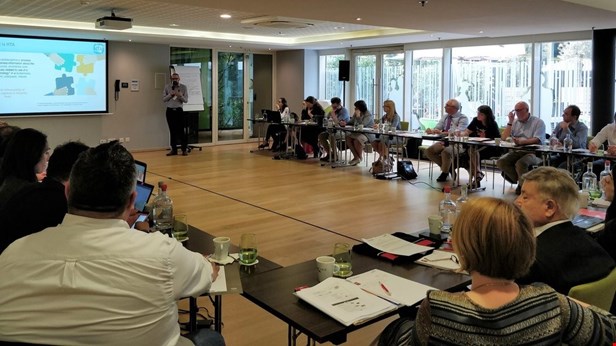Patient-MedTech Dialogue Workshops

On 24 and 25 May, in the context of the Patient-MedTech Dialogue, EPF and MedTech Europe organised two half a day workshops on HTA and medical technologies and Community care and access to medical technologies.
The Patient-MedTech Dialogue is an initiative that began in 2011 with the aim of providing a platform for the exchange of perspectives between the patient and MedTech communities, exploring topics of mutual interest.
Participants included patient organisation representatives as well as representatives of MedTech companies.
Workshop on HTA and medical technologies
HTA is a multidisciplinary process that summarises information about the medical, social, economic and ethical issues related to the use of a health technology in a systematic, transparent, unbiased, robust manner. Its aim is to inform the formulation of safe, effective, health policies that are patient focused and seek to achieve best value. A legislative proposal on strengthening EU cooperation on HTA was presented by the European Commission on 31 January 2018.
In this context, the workshop provided participants with the opportunity to acquire knowledge about the role of HTA and more specifically HTA for medical technologies. The legislative proposal was presented by the European Commission followed by presentations of the patient as well as medical technology perspectives. Questions arising from the discussion included the great variety of diagnostic and therapeutic technologies and differences in access to these across countries, as well as the role of HTA as a bridge between scientific evidence and decision-making. The role of HTA in identifying unmet needs and describing real added value was also discussed.
The second part of the workshop looked at how patient involvement in HTA for medical technologies can be improved, as currently a relatively low number of assessments include the patient perspective. Participants were split into small groups to discuss barriers to patient involvement but also the enablers of and opportunities for meaningful patient involvement in the assessment of medical technologies and how this could foster improved access. Proposals made by the groups are highlighted in the report of the workshop’s outcomes.
Workshop on community care and ensuring equal and broad patient access to medical technologies
The Council of the European Union adopted in December 2017 Council conclusions on ‘Enhancing Community-Based Support and Care for Independent Living’. The overall message was clear: steps towards the acceleration of the transition from institutional to community-based care need to be taken.
In this context and given the mutual interest in the topic, the workshop began with the presentation of the Health First Europe model for community care outlining a roadmap based on six pillars. The MedTech and patient perspectives to how community care can support improved access to medical technologies and how these can facilitate care in the community were presented. Participants discussed barriers and challenges to home and community care as well as the benefits to the patient and to the sustainability of healthcare systems. The need to break down silos and the optimal use of eHealth solutions to achieve community care was also discussed. National level examples of positively implemented community care initiatives as part of integrated patient care models were shared. Here again, the discrepancies between EU countries were raised, with one participant asking, “When will we all get there?” making reference to the differences in care models between western and central/eastern European countries.
The workshop continued with the mapping of the patient journey through the healthcare system, identifying facilitators and barriers to effective community care solutions and successful disease management along the care pathway, highlighting the challenge of under-resourced primary care and the resulting negative impact on access and the importance of structured disease-specific education as an enabler of improved self-management and successful community care. The group went on to discuss the differences in community care across countries and the challenges of healthcare professional cooperation. (See the report here)
Both workshops were successful in meeting the objectives set, providing a vibrant and open environment for discussion and exchange.
